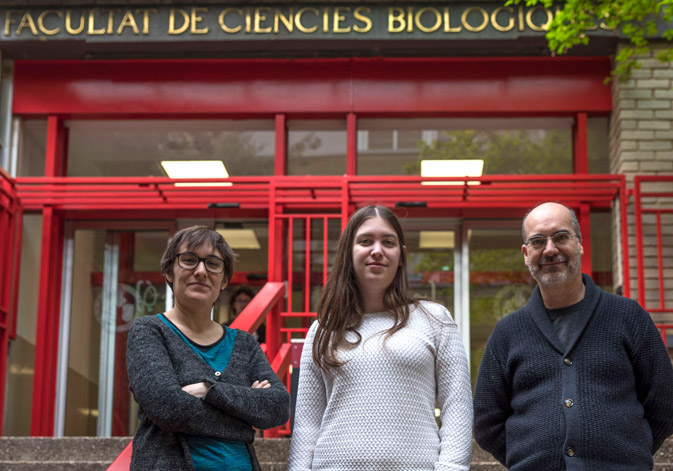Research on how affects the absence of the gene MECP2 in the neuronal maturation, responsible for the Rett syndrome
- Scientific Culture and Innovation Unit
- April 10th, 2019

A research team lead by the Universitat de València, in which several institutions participate, has concluded that the absence of the gene MECP2 provokes an increase of immature neurons that contain the DCX protein, in specific areas of the olfactory system. The work, published in the Brain Structure and Function magazine, is related to the Rett syndrome and to autism spectrum disorders.
This study is a starting point for the research of the consequences of the deficiency of the MEPC2 protein in the development and functioning of the olfactory system in the adult stage in the Rett syndrome, a neurological disorder with a genetic base that almost exclusively occurs on women.
A the professor of the Faculty of Biology of the UV and researcher of the ‘Unitat Mixta de Investigación Neuroanatomía Funcional’ of the Universitat de València and the University Jaume I, Carmen Agustí, explains: ‘The mutation that causes the Rett syndrome is known only for the 20 past years, which means that we still don’t know enough about the neurobiological bases of this syndrome. For the existence of applications, it is necessary the existence of studies of basic science that research these bases.’
The work intents, in a long-term, to know the deficit that are presented with the mutilation of MECP2 in the molecular, cellular and neuronal processes, which can lead to the discovery of new therapeutic methods. On this sense, according to Carmen Agustín, the study ‘implies to know better the consequences that the loss of the function of MECP2 has in the cerebral development and plasticity.’ In the work, which is part of the thesis of Elena Martínez-Rodríguez, the professors of the Universitat de València Enrique Lanuza and Juan Nácher, along the predoctorate researcher Simona Coviello and Cristina Foiani, an Erasmus student from the Università di Ferrara have participated.
The study, departing from the mutations on the gene MECP2 in mouse models and its posterior comparative to other mouse without the mutation, demonstrates that the absence of this gene provokes a significant increase in the quantity of neurons that have the ‘doblecortina’ protein in specific areas of the olfactory system, specifically, the piriform cortex and the olfactory tubercle.
The increase of ‘doblecortina’ protein in the piriform cortex is very important, since according to the research team ‘the deficit can be found in cells that are generated along the embryonic development and stay in an immature state, meanwhile in other areas of the olfactory system the production of new neurons occurs during the entire life of the animal.’
The cells of the olfactory cortex of embryonic generation that stay in an immature state are abundant in primates and it seems that also in human beings, according to Carmen Agustín. For that, to know the mechanisms for what this cells can mature shows new ways to research this project in disorders associated to a problem of neuronal maturation. Furthermore, the immature cells of the olfactory tubercle had not been described until the date.
The next step, as Agustín-Pavón points out is: ‘to understand the process of neuronal maturation better, analysing other factors and, in the future, to see what factors could normalise this process, and also to research the characteristics of the new quantity of immature neurons discovered in the olfactory tubercle.’
In the research, apart from the Universitat de València, have participated the researcher Mónica Santos, expert in the Rett syndrome and currently working on the Centre for Neuroscience and Cell Biology of the University of Coimbra (Portugal), and researchers of the University of Otto-von-Guericke of Deutschland and the research team in ‘Neurobiologia del Comportament’ (GReNeC-NeuroBio) of the Pompeu Fabra University.
Artículo:
Martínez-Rodríguez, E., Martín-Sánchez, A., Coviello, S. et al. «Lack of MeCP2 leads to region-specific increase of doublecortin in the olfactory System». Brain Struct Funct (2019). https://doi.org/10.1007/s00429-019-01860-6
















